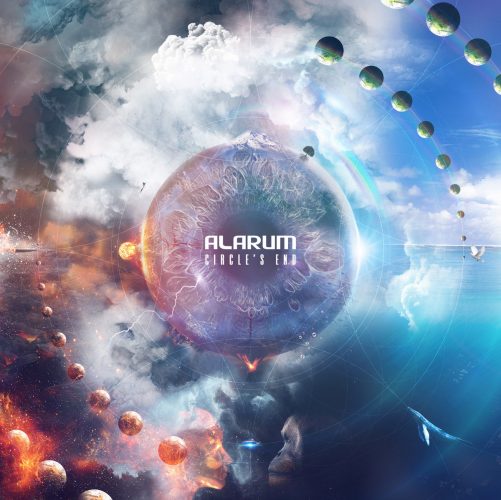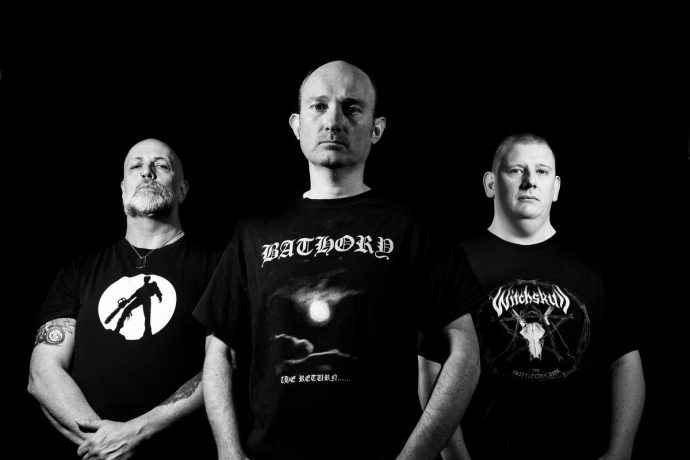
(TheMadIsraeli prepared this review of the latest album by the long-running Australian band Alarum, which was released in June by Dinner For Wolves.)
The very idea of progressive metal in modern metal is trapped in a weird state of limbo. We have a problem lately with labeling things progressive that are, frankly, not at all. They meet none of the requirements for the style, but the songs are over seven minutes long so we think surely that’s the qualifier. As someone who appreciates the eccentricity in progressive metal of any sort enthralling, it’s a bit insulting to me that “our” standard has dropped so low that we consider bands like Black Crown Initiate to be progressive. They are, no doubt, an excellent band, one of modern extreme metal’s best current acts, and fantastic musicians, but their music is not progressive.
When I think of metal that is progressive, I think envelope-pushing, I think weird fusion ideas or the ability to write a comprehensively diverse album that hits an insanely wide array of peaks and valleys while maintaining a cohesive core sound. A group could do this based on a “gimmick”, of course, and could have an objective, perhaps oriented around jazz for example, and that’s fair as long as the music you’re writing actually tries to push and incorporate jazz into your metal in such a way that the spirit of jazz is in no way diluted.

You may feel that my opening paragraphs here were pretentious as fuck and maybe a little elitist and gatekeepy, but this is a conversation that needs to be had. I dislike the diminishing of what actual progressivism in metal looks like that’s going on, especially in journalism circles.
That brings me around to Alarum, an Australian band who have typically been labeled progressive death metal, which is a fair enough comparison maybe. They are equal parts death metal, thrash metal, jazz, and a little bit of Boston/Kansas style flair all in one package that fully embraces in equal measure the maximum amount of essence of those styles. They are also, by both generally agreed-upon definition and my own personal take on the matter, a truly progressive band.
They do not conform to generic song structure, they most definitely are virtuosos in their song-writing craft and in their instrumental performances, and their music has always felt like they are trying to move beyond and ascend to the next level, whatever that may be. Like Nonexist, whose new album I reviewed recently, Alarum are one of those bands who have gone so criminally unnoticed by the metal world that I just don’t get it man.
Circle’s End is the first Alarum record in nine years, although this is not a comeback attempt. Alarum have always taken a long time between records, and the music shows the positive results of their patience. Sub-three minute opener “Sphere Of Influence” alone encompasses five different genres on display with spotlights on all of their influences at work. The out the gate police door kick of thrash metal, the jazz breaks, and the otherworldly melodies are a pretty good introduction to what Alarum are about, although the highlight for me is the gorgeously triumphant melodic explosion that ends the song.
Gorgeous contemplative and morose melodies are kind of Alarum’s jam. It’s a very Extol-ish kind of approach to melody. It’s all buried underneath masterfully technical riffing and jarring heavy/clean and metal/jazz transitions, combined with thrown-in surprises like the drums hitting Samba beats and the like. This isn’t to say that there isn’t any of the kind of darkness or bleakness usually associated with death metal, but it’s reserved for impact. On songs like “Sand” and “War Of Nerves” the atonal chaos is brought about and allowed to shine as much as anything else, but it’s hard to deny the band’s power on songs like “Syzygy” or closer “Sojourn” when they’re just bathing you in a wash of technical layered melodic radiation storm.
The mix of this album is powerful, with a huge emphasis on clarity but never losing the bite and grit. Especially on the drum front, this is probably my favorite drus mix of the year on a metal record. The jazz and acoustic sections are so lush in comparison to the actual thrash and death metal sections, which bite with the intensity of cobra fangs.
Progressive metal should consistently hit you with a sensation of “I never would’ve thought to write that/do that/put those things together”. This record does that, all while being oppressively heavy, brutal and frantic in its own way. The thing of course that’s most impressive is that they manage to fit in all the chaos they create in a way that makes the music still feel cohesive, and they don’t even have to write long songs to do it. This is the kind of eccentricity I love, but I feel it can only truly be communicated by listening.
I hope you enjoy this album as much as I have. To me, this record stands as a defiant testament in 2020 to what true progressivism expressed through metal really sounds like.
BUY:
https://www.alarum.com/store
https://alarumofficial.bandcamp.com/album/circles-end-2
ALARUM:
https://www.alarum.com/
https://www.facebook.com/alarumofficial/

Your opening paragraph highlights an interesting tendency we have as fans to use genre tags as shorthand, rather than to express their actual semantic meaning. This is especially noticeable with appelations such as progressive or technical. If we use progressive in the way you advocate here, as an expression of boundary pushing in relation to genre and song structure, there’s an issue of “creep”; the next band that comes along has to push the boundary even further, or they don’t count. You can’t work to perfect an established blend of sounds and still be progressive under this definition.
On the other hand, if we use the tag as a shorthand to encompass a wide array of embellishments on the core genre, like clean vocals or major chords or longer songs, there’s the opposite problem of stagnation, where the tag loses its value because progressive no longer actually means progressive.
The most obvious expression of this whole issue, in my opinion, is technical, as in technical death metal. This tag is now typically attached to what are, to me, three distinct genres. There’s a whole industry of extremely polished worship of Necrophagist, Obscura, and Spawn of Possession; there’s the angular dissonant skronk whatever of Ulcerate et al; and there are bands like Teeth and Chaos Motion attempting to push the actual definition of technical to new heights.
When a genre tag is used this expansively it really loses its value in communicating expectations to the potential listener, but creating new genre tags to encompass the sonic diversity becomes too complicated.
All those words to say, I agree with your point, but I’m not sure there’s an easy alternative solution to the problem. Also, Alarum is pretty sweet.
buried lede
It’s what I do best.
This is why many of my friends and I use the term dissonant technical death metal. Some will argue it doesn’t apply but I’d say it does seeing as Gorguts is tech-death and Ulcerate started out that way. In the same way I agree with how you view progressive used well as a shorthand explainer….I feel dissonant tech-death works as well. At a minimum, it’s a better descriptor when it is entirely applicable because not all dissonant death is highly technical in nature so this helps to describe and divide things better.
I’m comfortable with the “dissonant” terminology. It’s been a surprise to me how much that offshoot of the style has coalesced around a similar unified sound. I suspect it will diversify and become harder to sum up in a word, but such is the nature of music.